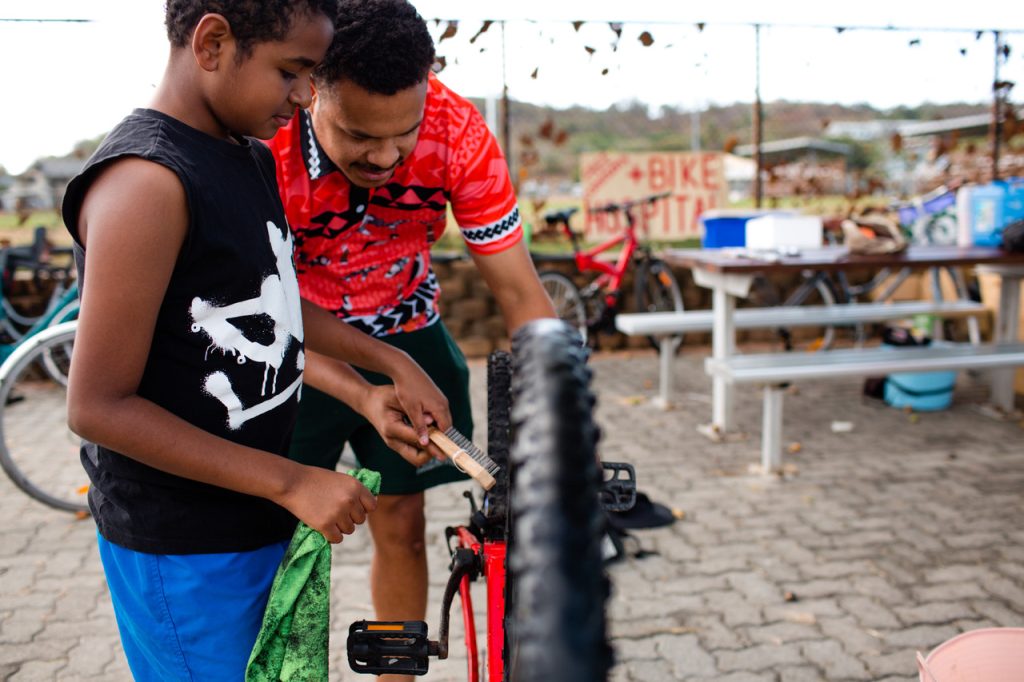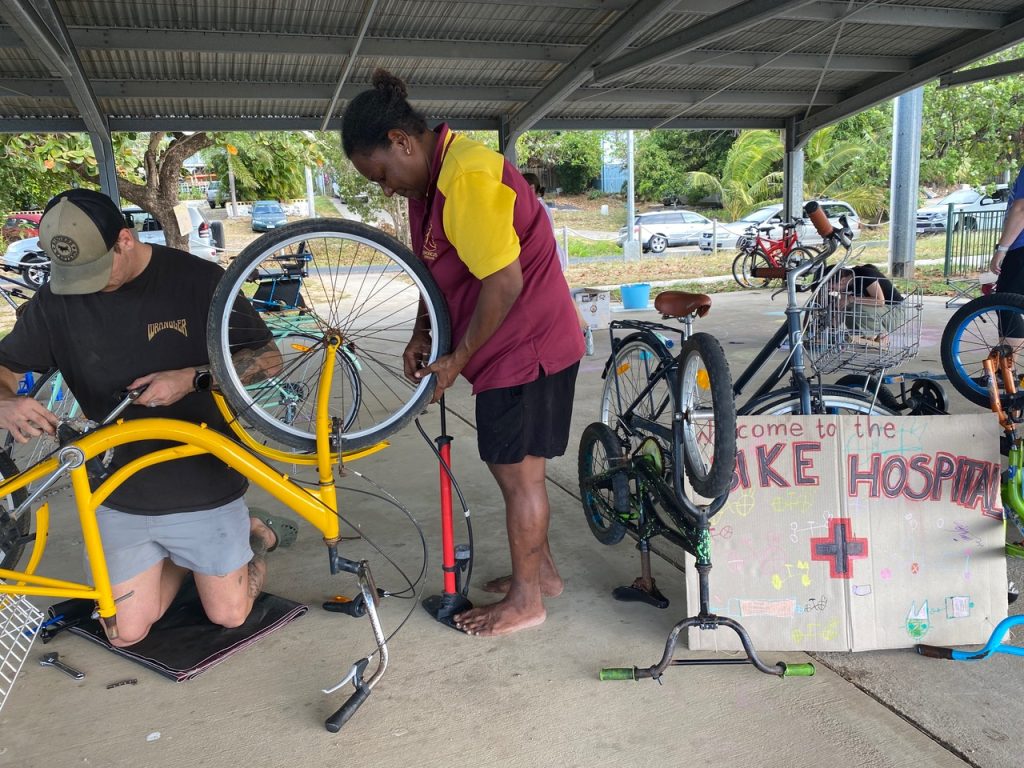On Waibene/Thursday Island in the Torres Strait, a grassroots movement is transforming how locals move through community, one bike at a time, overcoming the barriers of remoteness to make sustainable transport accessible to First Nations women, mothers, caregivers, and children
The Torres Strait Ride Revolution is a community-led initiative bringing together climate action, Indigenous leadership, and organising from below on Waibene/Thursday Island. Through mutual aid practices like bike-to-school buses and community repair spaces, the project shows how communities can mobilise against fossil fuel dependence.

Torres Strait Ride Revolution
It’s 8:09 am on a Friday morning, and we’re climbing the small hill on the ring track towards Bach Beach. There’s views of nearby islands across the water, but our eyes are fixed on the incline ahead. Six kids form the bike gang—a ragtag convoy pedaling with determination, despite the challenges of their rides. Brake cables dangle uselessly, tyres are more hole than whole, pedals wobble, and rusty chains clatter. Yet, as we crest the hill, feet churning around too-small wheels and knees clunking elbows – the magic of momentum takes over – and becomes a majestic glide to the beat of the mini speaker tunes that carries us down the slope, and shouts of joy that take us to the next stop.
This is the bike-to-school bus, an initiative that celebrates what getting around Waibene / Thursday Island could be. Situated in the Coral Sea between mainland Australia and Papua New Guinea, the island is a vibrant hub for its 3,000 residents, 70% of whom are Aboriginal or Torres Strait Islander. For these kids, bike riding is more than just transportation; it’s a way to connect with their peers, foster independence, and traverse the island’s modest 5-kilometre circumference.
Yet, despite the joy these rides bring, there’s a distinct shortage in numbers. Why? A glaring scarcity of reliable bikes. Import costs make purchasing a new bicycle prohibitively expensive, while local options are often of poor quality. Many families face barriers to owning or maintaining a bike, leaving them reliant on cars and taxis—a costly and unsustainable norm on this remote island.
With a vision to increase access to bicycles for everyone, Mobilise TI has sparked a grassroots movement. Monthly Bike Hospitals provide free repairs, breathing new life into bikes that might otherwise rust away. The Free Bike Exchange connects unused bikes, often from transient workers—those who come to the region for short-term government roles—with local kids and families who lack access to one. These initiatives have created a thriving ecosystem of reuse, resourcefulness, and community support, addressing a vital need while reducing waste. However, we want more people, especially women, mothers, caregivers and kids, to have access to high quality bicycles.
This is where the Ride Revolution comes in. We want to bring up a shipping container filled with:
- 70 bicycles – for children and adults;
- Bike racks, baskets and/or baby seats – to enable the bicycles to be more practical as an alternative to a car, and accessible to families with young children;
- Tools and parts – to properly establish the Bike Hospital; and
- Local training in bike maintenance and repair for First Nations youth – to ensure all bicycles on the island can be maintained over time.

Why the Ride Revolution Matters
The Ride Revolution isn’t just about bicycles—it’s about what bicycles represent: freedom, equality, and sustainability. Here on Waibene, where fuel prices soar and public transport is non-existent, bikes offers an affordable and practical solution.
For kids, bikes mean access. Access to school, to extracurricular activities, and to a sense of ownership over their mobility. For adults, bikes mean freedom from the financial strain of car dependence and an opportunity to embrace healthier, more active ways of life. And for the island itself, where the ecological impact of fuel reliance is significant, bikes mean a resilient, more sustainable future.
The Ride Revolution also underscores the importance of cultural values. On an island rich in Torres Strait Islander heritage, the campaign reinforces a sense of shared responsibility. Biking fosters togetherness; it creates connections—between neighbours, between generations, and between newcomers and long-time residents. Every exchanged bike carries a story, and every repaired chain represents a step toward greater community resilience.

Worthy of Support
The Ride Revolution means investing in a future where mobility isn’t a privilege but a right. It’s about ensuring that kids like those in the Friday bike gang can ride with confidence on safe, sturdy bikes. It’s about empowering families with access to tools to repair their own bikes, teaching skills that stay in the community. And it’s about building a culture that values sustainability, equity, and joy.
*
The Ride Revolution is at a crucial moment. With committed donations of 25 adult bikes from Ports North and 25 children’s bikes from Revolve Recycling, the initiative can take another step in transforming mobility on Waibene. But getting these bikes to the island requires covering significant freight costs – the campaign needs to raise $20,000 by 11 December, with $16,000 already secured. Any funds raised beyond the target means more bikes, accessories, and resources for the community. So, not just moving bikes across water, but moving an entire community.
Mobilise TI recognises the Traditional Owners of the land on which we live, work, ride and play, the Kaurareg people. We believes that more sustainable transport options would mean our actions could better align with this acknowledgement, and would offer a meaningful way to respect Kaurareg Country and culture.
You can support the Torres Strait Ride Revolution at bit.ly/riderevolution and help build a future where mobility justice begins at the grassroots.
Images courtesy of Mobilise TI.

Can I donate a bike in excellent condition? Only ever used once.
I have a ladies bike with a raddled seat on the back. Tyres need pumping or need new ones . It been in our shed. Do Do you pick up or we deliver to an address?
Zander, that is so generous! Thank you.
If you’re in or near Brisbane, you could take it to Bikes4Life. https://bikes4life.com.au/brisbane/
If you’re in or near Sydney – you could take it to Revolve Recycling in Alexandria (or one of their collection points). https://revolverecycling.net/donate-your-bike/
If you’re in or near Melbourne, you could take it to BrainWave Bikes. https://brainwavebikes.org.au/pages/bike-donation?srsltid=AfmBOooaGuVlJ_m39uwXF3Hnqi6xRnNlj3MLZ25V3eTs-fRBM5HBge5v
The bikes we’re bringing up will be from Revolve Recycling, so there’s a chance it will get up to us via them – but no matter where you take it, it will have a second life with someone!
If you’re not near any of those places – look up donate a bike and your location, and I’m sure there’ll be something similar.
Sarah
I have a ladies bike with a raddled seat on the back. Tyres need pumping or need new ones . It been in our shed. Do you pick up or we deliver to an address .